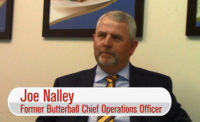Joe Nalley Interview Part 4: How automation evolved in the industry
Former Butterball COO Joe Nalley spoke with The National Provisioner editor-in-chief Andy Hanacek as he retires after 46 years about a variety of topics in the industry. Watch all videos here. In the fourth part of the series, Nalley discusses the issue of labor shortages and how automation helps that problem.
Andy Hanacek: Joe, thanks again. Here’s another topic we can cover here as you start your retirement, looking back at the industry over 46 years. It’s been a topic that has been brought up in my 12 or so years on The National Provisioner, but it seems lately it’s been on the minds of everybody lately, almost as much as food safety which keeps people up at night, and that’s labor and the shortage of labor, the inability of plants to fill all the positions that they need to fill. Talk about the differences in labor in general over those 40 years. Has it always been an issue even 40 years ago? And then maybe go into some of the ways in which you have seen automation help to stem the bleeding, I guess in some ways, of the labor problem over the years.
Joe Nalley: I think to your point labor has always been somewhat of a challenge in our industry, but it was much more available in the early years in my career than it is today. When I first got involved on the beef side—this would have been in the early 80s—that was a time when IBP kind of established the boxed beef program and wages were being negotiated downward, far downward from where they might have been with some of the branded companies like Oscar Mayer, Wilson, or the old Rath Packing Company or places like that. What we’ve seen now through the years, especially over the last few years, is that labor availability has just gone away. I know more recently here with Butterball it’s been a real challenge even though there have been wage increases, which had been counter to what I had been used to growing up in the industry, but unprecedented wage increases that you just got to do it if you are going to find the people, and even then it’s not enough.
Technology is a broad subject, but one of the places where it seems to apply the most to our industry is automation of one sort or the other. Automation does not necessarily mean it’s going to actually displace jobs or in some cases it does, but it makes jobs easier to train people. So you get somebody working, and if they are coming in off the street, they can sometimes learn to be running at 100 percent efficiency within just a few days as opposed weeks or even months when you were doing it by hand, and then the job is just more desirable. At Butterball, we put in an automatic deboning system several years ago that made a huge difference, and there’s more, the CO2 stun system. It was amazing what it was like trying to hang 50 pound turkeys. Now you are using this automatic stun system and people don’t even have to touch them. It really works very, very well. And there is room for automation all over the industry, so I think that is a key that the industry should be focusing on, and they will. They have to.
Hanacek: It’s been amazing in the little over a decade that I have been in the industry. I was covering the snack food and bakery industry prior to this. I remember the first few meat plants and poultry plants I went into, I was amazed at the lack of automation on say the packaging side, cartoning and things like that. I had just come out of the snack world where it was all zip-zip-zip-done. It was amazing to me. So it’s been really neat to see that end start to pick it up and get more automated and find solutions there.
Nalley: Well, the industry understands that. Today the animals coming into our plant are more consistently sized, which lends itself to automation, because you can only work within certain weight ranges in order to make automated equipment work properly although there is usually pretty good flexibility at that. The industry has been fairly slow, but the whole labor issue and the idea that we can do it better, more consistently, better quality… like our discussion earlier consistency is a key and the consumer demands it and has every right to expect it.
Hanacek: Do you find that yield is the primary barrier to automating processes, or is it cost? What are you seeing as the barrier nowadays?
Nalley: The initial capital is always the one that is a little hard to stomach, and you can calculate paybacks on that. In some cases, we were told that if we put this automated deboning system in with Butterball, we would have to suffer some yield loss. Actually, we found it to be just the opposite. We found that we had yield improvements by doing that, and automation has come a long, long way. I haven’t been in a beef plant or a pork plant in quite a while, but I’m sure I would be amazed at all the things that are done automated today with maybe someone operating the equipment pushing buttons and turning dials and not out there with a big split saw splitting carcasses by hand.
Check out the rest of our video series with former Butterball COO Joe Nalley!
Looking for a reprint of this article?
From high-res PDFs to custom plaques, order your copy today!



